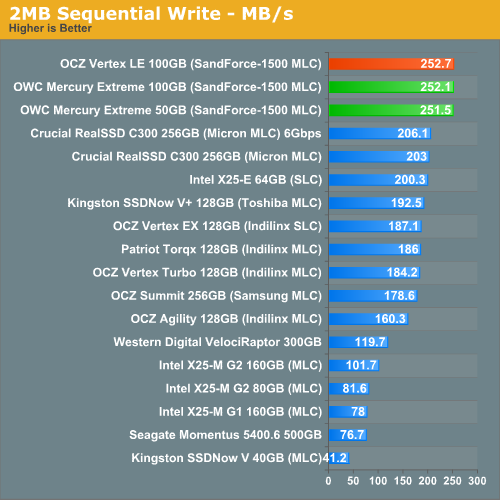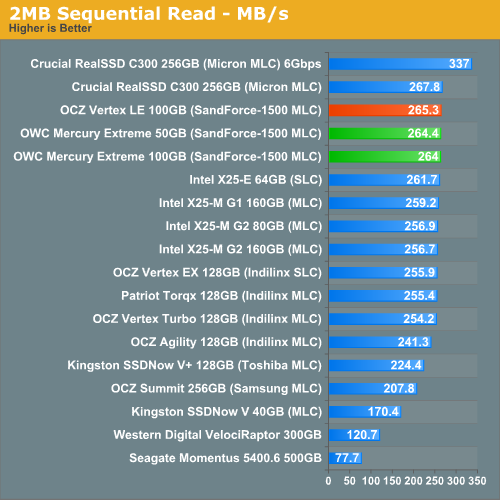OWC Mercury Extreme SSD - First Look at a 50GB SandForce Drive
by Anand Lal Shimpi on February 26, 2010 12:00 AM EST- Posted in
- Storage
Sequential Read/Write Speed
Using the latest build of Iometer I ran a 3 minute long 2MB sequential write test over the entire span of the drive. The results reported are in average MB/s over the entire test length:

Sequential write speed is completely unaffected by the drop in capacity. The 50GB $229 OWC Mercury Extreme performs just as well as the 100GB version from OWC or OCZ. The three also happen to be the fastest SSDs I've tested at this point in terms of sequential write speed.

Sequential read speed is also unaffected. There's absolutely no drop in performance here when you go to the smaller capacity. This is why OWC states that the 50GB drive performs just as well as the 100GB and 200GB drives. The next page will show you why that's a false statement.










74 Comments
View All Comments
lorteti - Saturday, February 27, 2010 - link
Anand,How about the used drive performance?
I'm currently still unsing Vista, no plan upgrading to Win7 this year.
I think many are still using older OS.
Does these SSD's SandForce and C300 perform the same in used condition without TRIM?
jx
shawkie - Saturday, February 27, 2010 - link
Anand, can you please include some discussion and/or benchmark on power consumption for those users with laptops?shawngmc - Saturday, February 27, 2010 - link
Anand,Can you confirm whether or not this series of drives have Trim support? I had emailed OWC's tech support to try to find out, and they responded saying that their drives handle Trim internally.
I asked if I could get some details on this, but the technician did not have any. I can understand if they do automatic garbage collection, and I understand that the cycling is much lower due to the low 'write amplification' factor, but that's still not Trim support. You said that the Vertex LE supported Trim, and it's roughly the same drive, but I don't want to make an assumption I'll regret.
It's especially vexxing since OSX has no native Trim support, while I want to use this as a Windows 7 drive (as will many people after this review).
I've been waiting for SSD prices to drop, and while this isn't a drop inherently, 100GB that literally saturates SATA II for $400 is a very tempting spot to jump in.
Thanks,
Shawn
ScavengerLX - Saturday, February 27, 2010 - link
Do you dream about SSDs, Anand?Paladin1211 - Saturday, February 27, 2010 - link
Normally you dont dream about your work, right? :DScavengerLX - Saturday, February 27, 2010 - link
Yes :-Diwodo - Friday, February 26, 2010 - link
"6Gbps SATA will only improve large file read performance off of the drive. Loading apps and games shouldn't be any faster. Nearly all high performance SSDs load a single app/game in about the same time. "So you are saying we are already reaching tipping point where SATA3 with 700MB/s Seq Read / Write wont give us any perceivable performance advantage? I did do any research or test, but surely Apps like Photoshop / Office / Games require to load more then few hundred MB right?
Paladin1211 - Saturday, February 27, 2010 - link
I think the statement is pretty logical. Assume that you have 350MB/s sequential read and I have only 200MB/s. We both need to read a file of 20MB. Then it would take you 0.057 sec or take me 0.1 sec. Even a mouse click would take longer than the 0.043 sec difference :)To load apps and games means to process a lot of small files, not one large file of multi hundred MB. This is where random read/write comes into play, negating most of the sequential advantages.
Conscript - Friday, February 26, 2010 - link
thanks for the review Anand, I've been looking up and down at these drives and was waiting for a reliable review. I am concerned that they won't let you open em up. Tell ya what, why don't you give them the $229, check to make sure there's nothing funny going on, and when you put it back together and check that it still works, I'll buy it off ya...and a used discount of course :)ssdreviewer - Friday, February 26, 2010 - link
we would like to see more latency benchmark info in all SSD reviews, such as AS SSD benchmark, HDTune Pro access time etc.